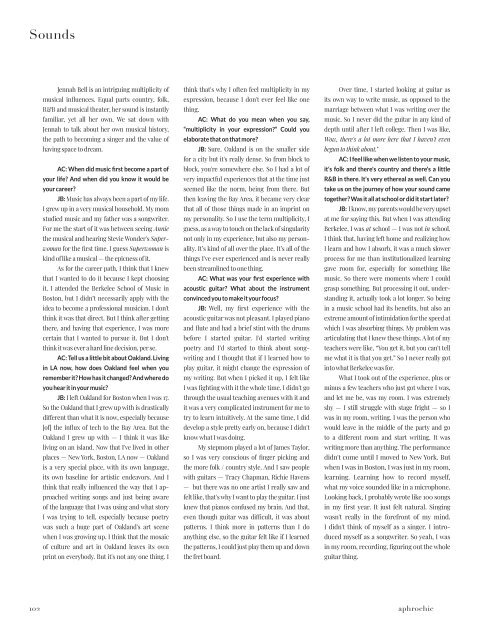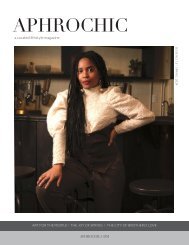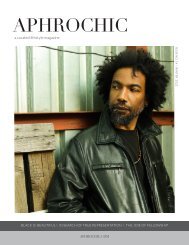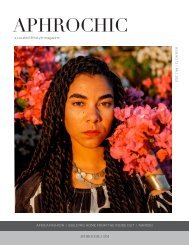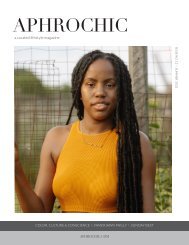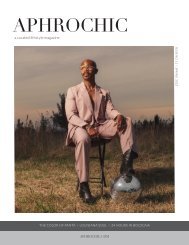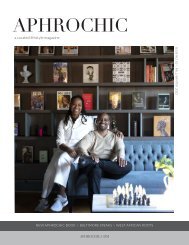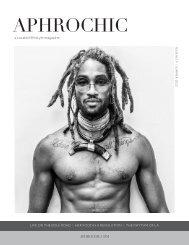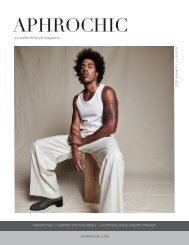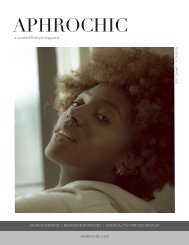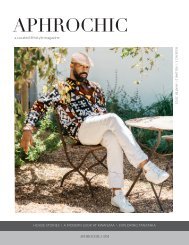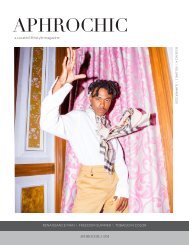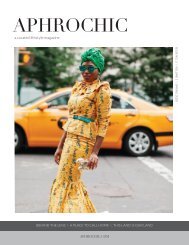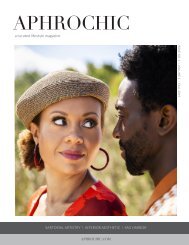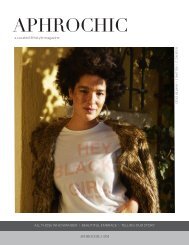AphroChic Magazine: Issue No. 8
This issue is about revolution, remembrance, and rebirth. In Dubai, Chef Alexander Smalls is launching a first-of-its-kind food experience celebrating the culinary revolution taking place in Africa. In New York, as fashion week returned, House of Aama launched a collection remembering the elegance of 20th century Black resort towns. In Philadelphia, Chanae Richards is carving out space for rest, relaxation and meditation. And in Los Angeles, our cover star, Jennah Bell, is part of a renaissance of music that is indie, soulful and written from the heart. In this issue we take you to The Deacon hotel designed by Shannon Maldonado. And in our Wellness section, we let you in our own road to rebirth, through the journey with long-haul COVID that has defined our life this past year. In our Reference section we explore new thoughts on the African Diaspora. Looking beyond the history behind the word to explore the idea itself, opening new worlds of possibility as we begin working to understand what the African Diaspora actually is. And we take you inside the importance of the emerging Black art scene heralded by the Obama portraits which, now well into their national tour, made a memorable stop at the Brooklyn Museum.
This issue is about revolution, remembrance, and rebirth. In Dubai, Chef Alexander Smalls is launching a first-of-its-kind food experience celebrating the culinary revolution taking place in Africa. In New York, as fashion week returned, House of Aama launched a collection remembering the elegance of 20th century Black resort towns. In Philadelphia, Chanae Richards is carving out space for rest, relaxation and meditation. And in Los Angeles, our cover star, Jennah Bell, is part of a renaissance of music that is indie, soulful and written from the heart.
In this issue we take you to The Deacon hotel designed by Shannon Maldonado. And in our Wellness section, we let you in our own road to rebirth, through the journey with long-haul COVID that has defined our life this past year.
In our Reference section we explore new thoughts on the African Diaspora. Looking beyond the history behind the word to explore the idea itself, opening new worlds of possibility as we begin working to understand what the African Diaspora actually is. And we take you inside the importance of the emerging Black art scene heralded by the Obama portraits which, now well into their national tour, made a memorable stop at the Brooklyn Museum.
You also want an ePaper? Increase the reach of your titles
YUMPU automatically turns print PDFs into web optimized ePapers that Google loves.
Sounds<br />
Jennah Bell is an intriguing multiplicity of<br />
musical influences. Equal parts country, folk,<br />
R&B and musical theater, her sound is instantly<br />
familiar, yet all her own. We sat down with<br />
Jennah to talk about her own musical history,<br />
the path to becoming a singer and the value of<br />
having space to dream.<br />
AC: When did music first become a part of<br />
your life? And when did you know it would be<br />
your career?<br />
JB: Music has always been a part of my life.<br />
I grew up in a very musical household. My mom<br />
studied music and my father was a songwriter.<br />
For me the start of it was between seeing Annie<br />
the musical and hearing Stevie Wonder's Superwoman<br />
for the first time. I guess Superwoman is<br />
kind of like a musical — the epicness of it.<br />
As for the career path, I think that I knew<br />
that I wanted to do it because I kept choosing<br />
it. I attended the Berkelee School of Music in<br />
Boston, but I didn’t necessarily apply with the<br />
idea to become a professional musician. I don't<br />
think it was that direct. But I think after getting<br />
there, and having that experience, I was more<br />
certain that I wanted to pursue it. But I don't<br />
think it was ever a hard line decision, per se.<br />
AC: Tell us a little bit about Oakland. Living<br />
in LA now, how does Oakland feel when you<br />
remember it? How has it changed? And where do<br />
you hear it in your music?<br />
JB: I left Oakland for Boston when I was 17.<br />
So the Oakland that I grew up with is drastically<br />
different than what it is now, especially because<br />
[of] the influx of tech to the Bay Area. But the<br />
Oakland I grew up with — I think it was like<br />
living on an island. <strong>No</strong>w that I've lived in other<br />
places — New York, Boston, LA now — Oakland<br />
is a very special place, with its own language,<br />
its own baseline for artistic endeavors. And I<br />
think that really influenced the way that I approached<br />
writing songs and just being aware<br />
of the language that I was using and what story<br />
I was trying to tell, especially because poetry<br />
was such a huge part of Oakland's art scene<br />
when I was growing up. I think that the mosaic<br />
of culture and art in Oakland leaves its own<br />
print on everybody. But it's not any one thing. I<br />
think that's why I often feel multiplicity in my<br />
expression, because I don't ever feel like one<br />
thing.<br />
AC: What do you mean when you say,<br />
“multiplicity in your expression?” Could you<br />
elaborate that on that more?<br />
JB: Sure. Oakland is on the smaller side<br />
for a city but it's really dense. So from block to<br />
block, you're somewhere else. So I had a lot of<br />
very impactful experiences that at the time just<br />
seemed like the norm, being from there. But<br />
then leaving the Bay Area, it became very clear<br />
that all of those things made in an imprint on<br />
my personality. So I use the term multiplicity, I<br />
guess, as a way to touch on the lack of singularity<br />
not only in my experience, but also my personality.<br />
It’s kind of all over the place. It’s all of the<br />
things I've ever experienced and is never really<br />
been streamlined to one thing.<br />
AC: What was your first experience with<br />
acoustic guitar? What about the instrument<br />
convinced you to make it your focus?<br />
JB: Well, my first experience with the<br />
acoustic guitar was not pleasant. I played piano<br />
and flute and had a brief stint with the drums<br />
before I started guitar. I'd started writing<br />
poetry and I’d started to think about songwriting<br />
and I thought that if I learned how to<br />
play guitar, it might change the expression of<br />
my writing. But when I picked it up, I felt like<br />
I was fighting with it the whole time. I didn't go<br />
through the usual teaching avenues with it and<br />
it was a very complicated instrument for me to<br />
try to learn intuitively. At the same time, I did<br />
develop a style pretty early on, because I didn't<br />
know what I was doing.<br />
My stepmom played a lot of James Taylor,<br />
so I was very conscious of finger picking and<br />
the more folk / country style. And I saw people<br />
with guitars — Tracy Chapman, Richie Havens<br />
— but there was no one artist I really saw and<br />
felt like, that's why I want to play the guitar. I just<br />
knew that pianos confused my brain. And that,<br />
even though guitar was difficult, it was about<br />
patterns. I think more in patterns than I do<br />
anything else, so the guitar felt like if I learned<br />
the patterns, I could just play them up and down<br />
the fret board.<br />
Over time, I started looking at guitar as<br />
its own way to write music, as opposed to the<br />
marriage between what I was writing over the<br />
music. So I never did the guitar in any kind of<br />
depth until after I left college. Then I was like,<br />
Wow, there's a lot more here that I haven't even<br />
begun to think about."<br />
AC: I feel like when we listen to your music,<br />
it's folk and there's country and there's a little<br />
R&B in there. It's very ethereal as well. Can you<br />
take us on the journey of how your sound came<br />
together? Was it all at school or did it start later?<br />
JB: I know, my parents would be very upset<br />
at me for saying this. But when I was attending<br />
Berkelee, I was at school — I was not in school.<br />
I think that, having left home and realizing how<br />
I learn and how I absorb, it was a much slower<br />
process for me than institutionalized learning<br />
gave room for, especially for something like<br />
music. So there were moments where I could<br />
grasp something. But processing it out, understanding<br />
it, actually took a lot longer. So being<br />
in a music school had its benefits, but also an<br />
extreme amount of intimidation for the speed at<br />
which I was absorbing things. My problem was<br />
articulating that I knew these things. A lot of my<br />
teachers were like, “You get it, but you can't tell<br />
me what it is that you get.” So I never really got<br />
into what Berkelee was for.<br />
What I took out of the experience, plus or<br />
minus a few teachers who just got where I was,<br />
and let me be, was my room. I was extremely<br />
shy — I still struggle with stage fright — so I<br />
was in my room, writing. I was the person who<br />
would leave in the middle of the party and go<br />
to a different room and start writing. It was<br />
writing more than anything. The performance<br />
didn't come until I moved to New York. But<br />
when I was in Boston, I was just in my room,<br />
learning. Learning how to record myself,<br />
what my voice sounded like in a microphone.<br />
Looking back, I probably wrote like 100 songs<br />
in my first year. It just felt natural. Singing<br />
wasn't really in the forefront of my mind.<br />
I didn't think of myself as a singer. I introduced<br />
myself as a songwriter. So yeah, I was<br />
in my room, recording, figuring out the whole<br />
guitar thing.<br />
102 aphrochic


